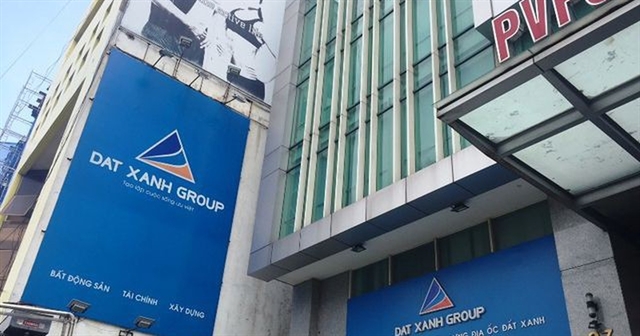Many realty companies reported losses in the first nine months of this year, due to the COVID-19 pandemic, tightening credit measures and legal hindrances.

Many realty companies reported losses in the first nine months of this year, due to the COVID-19 pandemic, tightening credit measures and legal hindrances.
The real estate sector accounts for the largest proportion on the stock market with 116 listed shares, equivalent to more than 7 per cent. Of them, 76 shares are listed on HOSE and HNX while 40 shares are traded on UPCoM.
On HOSE, the real estate group has a significant influence on the movement of the VN-Index.
Most realty shares have declined in both price and liquidity due to poor business results, except for some individual stocks such as Vingroup (VIC), Vinhomes (VHM), Vincom Retail (VRE), Novaland (NVL), Phat Dat Real Estate (PDR) and Development Investment Construction Corporation (DIG).
In the first nine months of 2020, Dat Xanh Group Joint Stock Company (DXG) only achieved revenue of VND1.88 trillion (US$81.2 million), down 51 per cent compared to the same period last year.
DXG reported a loss of VND388 billion, which caused its shares to be excluded from baskets of some important indexes such as VNDiamond Index.
C.E.O Group JSC (CEO) reported revenue of nearly VND682 billion in the first nine months, down 78 per cent over the same period last year. Revenue from financial activities reached nearly VND58 billion, up 18 per cent year-on-year, mainly from interest from deposits and loans.
The company suffered a loss of nearly VND103 billion, while the plan for the whole of 2020 was VND200 billion and last year’s profit was more than VND435 billion.
By the end of September, the value of short-term debt of CEO decreased 25 per cent, long-term debt increased 16 per cent compared to the beginning of the year.
During the period, the company reduced short-term loans at BIDV bank and increased long-term loans by more than VND217 billion via issuing bonds.
An Gia Real Estate Development and Investment JSC (AGG) reported revenue of VND13.6 billion in the third quarter of 2020, down more than 20 per cent compared to the second quarter and nearly 4.6 times lower than the same period in 2019. Post-tax profit was VND2.6 billion, down by a half year-on-year.
Notably, the company could not sell any apartments in the first nine months of 2020.
The industrial real estate sector was expected to achieve positive business results on hopes that the relocation of multinational companies from China to Viet Nam would help increase land rental prices. However, the businesses still reported lower profits.
Kinh Bac Urban Development Corporation JSC (KBC) recorded a loss of VND21 billion in the third quarter of 2020, causing the 9-month profit to fall over VND30 billion, down by 94 per cent compared to the same period in 2019. The reason for the decline in profit was a surge in administrative expenses and financial expenses.
Many shareholders are waiting for KBC's specific solutions to improve operating results, especially for the 100-storey Diamond Rice Flower tower project.
Low-cap stocks
Shares of Cotec Invesment & Land-House Development JSC (CLG) have continued to decline, now standing at over VND1,000 per share as the company is unprofitable and lacks transparency.
In 2019, CLG suffered after-tax loss of VND208 billion. In the first quarter of 2020, the company earned no revenue and suffered an additional loss of VND1.9 billion. CLG has not released its financial statements for the second quarter and third quarter this year.
Shares of Viet Property Investment Joint Stock Company, formerly known as Petroleum Real Estate JSC, now are being traded for VND1,000 per share. By the end of the second quarter of 2020, PVL achieved an accumulated loss of VND281 billion.
Ninh Van Bay Tourist Real Estate JSC (NVT), which owns the Six Senses resort project in Khanh Hoa Province – one of the most luxurious resort projects in Viet Nam – has reported insignificant profits for many years now.
Currently, NVT shares are on the alert list, with a market price of less than VND5,000 per share and dropping liquidity.
“Real estate stocks often have positive developments in the fourth quarter every year but investors should not expect much, because home buyers are still cautious at the moment,” said an investor named Tran Nhat Duc.
Viet Capital Securities Company estimates that Viet Nam will have an additional 1.1 million urban population each year, resulting in a new demand for apartments of about 314,000 units per year.
However, this company has said that not all real estate businesses can take advantage of this opportunity as their investment decision making depends on credit policy and clearing legal procedures. Thus real estate stocks will have a large differentiation. — VNS





